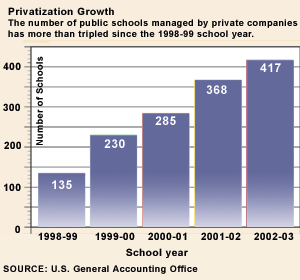A report that may be the first federal study to compare student achievement in privately managed public schools against that in other public schools sees both pluses and minuses for private companies.
“Public Schools: Comparison of Achievement Results for Students Attending Privately Managed and Traditional Schools in Six Cities,” from the U.S. General Accounting Office. Highlight of the 62- page report is also available. (Requires Adobe’s Acrobat Reader.)
The report, which the U.S. General Accounting Office prepared for the House Education and the Workforce Committee, uses student scores on state standardized tests and other school data to make the comparison.
“This report shows that some privately managed companies are having better results than traditional schools, but in some cases they didn’t,” said Marnie Shaul, the director of education, workforce, and income security issues for the GAO, the investigative arm of Congress.
But she cautioned that the report, released last month, focuses on only a small sample of schools. She said it does not gauge the effectiveness of all 417 public schools nationwide that are managed by 47 for-profit companies. More than three-fourths of those schools are charter schools.
Still, officials at some education management companies see the report in a mostly positive light.
Adam Tucker, a spokesman for New York City-based Edison Schools Inc., the nation’s largest for-profit manager of public schools, with 130 nationwide, said the GAO study showed that education companies were improving student performance on standardized tests.
“There’s a lot of merit in the report,” he said. “It begins to understand the contribution that education management companies are making to school reform.”
Educators and policymakers are closely watching the performance of schools run by school management companies such as Edison.
Ms. Shaul pointed out that schools that have not made adequate yearly progress consistently for five years, as required under the federal No Child Left Behind Act, may be restructured. One option policymakers can consider, she said, is to hand the management reins of the schools to for-profit companies.
Range of Results

GAO researchers compared state reading and mathematics scores and other data from 14 elementary schools managed by private companies since 1998 with at least 28 traditional public elementary schools in Cleveland, Denver, Detroit, Phoenix, San Francisco, and St. Paul, Minn.
They analyzed public schools that were similar to the privately managed schools in grade configurations, enrollment, race and ethnicity, percentage of English-language learners, and percentage of students living in poverty.
In Denver, 5th graders at a privately managed school scored 15 percentile points higher on average—572, compared with 557—on the state reading exam than did their peers at traditional public schools in the city.
In San Francisco, 5th graders at a privately managed school scored 9 points higher on average in reading and 7 points higher in math on the Stanford Achievement Test than did students at traditional public schools there.
By contrast, 4th graders in privately managed schools in Cleveland scored 16 percentile points on average lower than students at traditional public schools in the city. And in St. Paul, 5th graders at privately managed schools scored 1256 points on average in reading on the Minnesota Comprehensive Assessment Program, compared with 1469 for students at traditional public schools there.
Student scores in Detroit and Phoenix were similar for the privately managed and traditional public schools the GAO studied.







